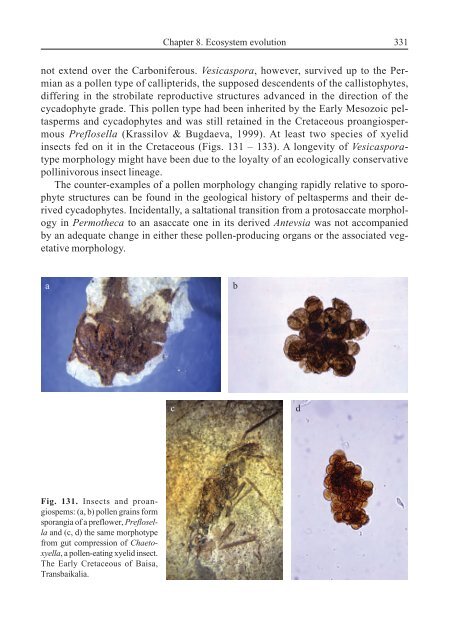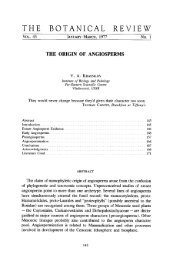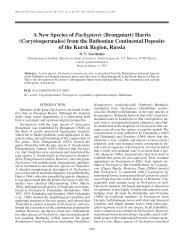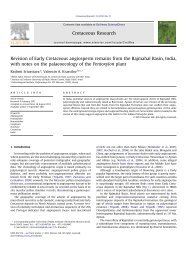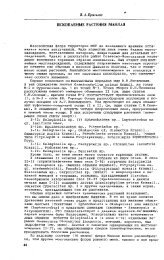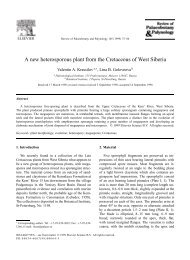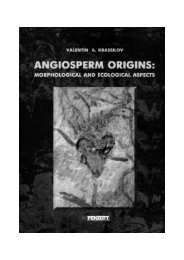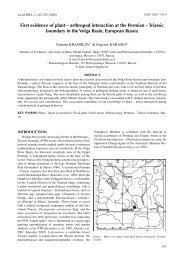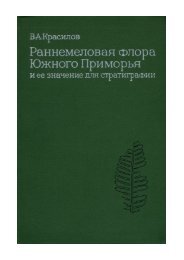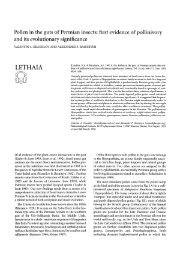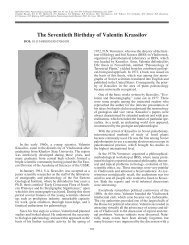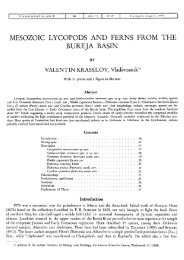- Page 1 and 2:
R U S S I A N A C A D E M I C M O N
- Page 3 and 4:
ii Valentin A. Krassilov. Terrestri
- Page 5 and 6:
iv Valentin A. Krassilov. Terrestri
- Page 7 and 8:
vi Valentin A. Krassilov. Terrestri
- Page 9 and 10:
viii Valentin A. Krassilov. Terrest
- Page 11 and 12:
x Valentin A. Krassilov. Terrestria
- Page 13 and 14:
xii Valentin A. Krassilov. Terrestr
- Page 15 and 16:
xiv Valentin A. Krassilov. Terrestr
- Page 17 and 18:
xvi Valentin A. Krassilov. Terrestr
- Page 19 and 20:
2 Valentin A. Krassilov. Terrestria
- Page 21 and 22:
4 Valentin A. Krassilov. Terrestria
- Page 23 and 24:
6 Valentin A. Krassilov. Terrestria
- Page 25 and 26:
8 Valentin A. Krassilov. Terrestria
- Page 27 and 28:
10 Valentin A. Krassilov. Terrestri
- Page 29 and 30:
12 Valentin A. Krassilov. Terrestri
- Page 31 and 32:
14 Valentin A. Krassilov. Terrestri
- Page 33 and 34:
16 Valentin A. Krassilov. Terrestri
- Page 35 and 36:
18 Valentin A. Krassilov. Terrestri
- Page 37 and 38:
20 Valentin A. Krassilov. Terrestri
- Page 39 and 40:
22 Valentin A. Krassilov. Terrestri
- Page 41 and 42:
24 Valentin A. Krassilov. Terrestri
- Page 43 and 44:
26 Valentin A. Krassilov. Terrestri
- Page 45 and 46:
28 Valentin A. Krassilov. Terrestri
- Page 47 and 48:
30 Valentin A. Krassilov. Terrestri
- Page 49 and 50:
32 Valentin A. Krassilov. Terrestri
- Page 51 and 52:
34 Valentin A. Krassilov. Terrestri
- Page 53 and 54:
36 Valentin A. Krassilov. Terrestri
- Page 55 and 56:
38 Valentin A. Krassilov. Terrestri
- Page 57 and 58:
40 Valentin A. Krassilov. Terrestri
- Page 59 and 60:
42 Valentin A. Krassilov. Terrestri
- Page 61 and 62:
44 Valentin A. Krassilov. Terrestri
- Page 63 and 64:
46 Valentin A. Krassilov. Terrestri
- Page 65 and 66:
48 Valentin A. Krassilov. Terrestri
- Page 67 and 68:
50 Valentin A. Krassilov. Terrestri
- Page 69 and 70:
52 Valentin A. Krassilov. Terrestri
- Page 71 and 72:
54 Valentin A. Krassilov. Terrestri
- Page 73 and 74:
56 Valentin A. Krassilov. Terrestri
- Page 75 and 76:
58 Valentin A. Krassilov. Terrestri
- Page 77 and 78:
60 Valentin A. Krassilov. Terrestri
- Page 79 and 80:
62 Valentin A. Krassilov. Terrestri
- Page 81 and 82:
64 Valentin A. Krassilov. Terrestri
- Page 83 and 84:
66 Valentin A. Krassilov. Terrestri
- Page 85 and 86:
68 Valentin A. Krassilov. Terrestri
- Page 87 and 88:
70 Valentin A. Krassilov. Terrestri
- Page 89 and 90:
72 Valentin A. Krassilov. Terrestri
- Page 91 and 92:
74 Valentin A. Krassilov. Terrestri
- Page 93 and 94:
76 Valentin A. Krassilov. Terrestri
- Page 95 and 96:
78 Valentin A. Krassilov. Terrestri
- Page 97 and 98:
80 Valentin A. Krassilov. Terrestri
- Page 99 and 100:
82 Valentin A. Krassilov. Terrestri
- Page 101 and 102:
84 Valentin A. Krassilov. Terrestri
- Page 103 and 104:
86 Valentin A. Krassilov. Terrestri
- Page 105 and 106:
88 Valentin A. Krassilov. Terrestri
- Page 107 and 108:
90 Valentin A. Krassilov. Terrestri
- Page 109 and 110:
92 Valentin A. Krassilov. Terrestri
- Page 111 and 112:
94 Valentin A. Krassilov. Terrestri
- Page 113 and 114:
96 Valentin A. Krassilov. Terrestri
- Page 115 and 116:
98 Valentin A. Krassilov. Terrestri
- Page 117 and 118:
100 Valentin A. Krassilov. Terrestr
- Page 119 and 120:
102 Valentin A. Krassilov. Terrestr
- Page 121 and 122:
104 Valentin A. Krassilov. Terrestr
- Page 123 and 124:
106 Valentin A. Krassilov. Terrestr
- Page 125 and 126:
108 Valentin A. Krassilov. Terrestr
- Page 127 and 128:
110 Valentin A. Krassilov. Terrestr
- Page 129 and 130:
112 Valentin A. Krassilov. Terrestr
- Page 131 and 132:
114 Valentin A. Krassilov. Terrestr
- Page 133 and 134:
116 Valentin A. Krassilov. Terrestr
- Page 135 and 136:
118 Valentin A. Krassilov. Terrestr
- Page 137 and 138:
120 Valentin A. Krassilov. Terrestr
- Page 139 and 140:
122 Valentin A. Krassilov. Terrestr
- Page 141 and 142:
124 Valentin A. Krassilov. Terrestr
- Page 143 and 144:
126 Valentin A. Krassilov. Terrestr
- Page 145 and 146:
128 Valentin A. Krassilov. Terrestr
- Page 147 and 148:
130 Valentin A. Krassilov. Terrestr
- Page 149 and 150:
132 Valentin A. Krassilov. Terrestr
- Page 151 and 152:
134 Valentin A. Krassilov. Terrestr
- Page 153 and 154:
136 Valentin A. Krassilov. Terrestr
- Page 155 and 156:
138 Valentin A. Krassilov. Terrestr
- Page 157 and 158:
140 Valentin A. Krassilov. Terrestr
- Page 159 and 160:
142 Valentin A. Krassilov. Terrestr
- Page 161 and 162:
144 Valentin A. Krassilov. Terrestr
- Page 163 and 164:
146 Valentin A. Krassilov. Terrestr
- Page 165 and 166:
148 Valentin A. Krassilov. Terrestr
- Page 167 and 168:
150 Valentin A. Krassilov. Terrestr
- Page 169 and 170:
152 Valentin A. Krassilov. Terrestr
- Page 171 and 172:
154 Valentin A. Krassilov. Terrestr
- Page 173 and 174:
156 Valentin A. Krassilov. Terrestr
- Page 175 and 176:
158 Valentin A. Krassilov. Terrestr
- Page 177 and 178:
160 Valentin A. Krassilov. Terrestr
- Page 179 and 180:
162 Valentin A. Krassilov. Terrestr
- Page 181 and 182:
164 Valentin A. Krassilov. Terrestr
- Page 183 and 184:
166 Valentin A. Krassilov. Terrestr
- Page 185 and 186:
168 Valentin A. Krassilov. Terrestr
- Page 187 and 188:
170 Valentin A. Krassilov. Terrestr
- Page 189 and 190:
172 Valentin A. Krassilov. Terrestr
- Page 191 and 192:
174 Valentin A. Krassilov. Terrestr
- Page 193 and 194:
176 Valentin A. Krassilov. Terrestr
- Page 195 and 196:
178 Valentin A. Krassilov. Terrestr
- Page 197 and 198:
180 Valentin A. Krassilov. Terrestr
- Page 199 and 200:
182 Valentin A. Krassilov. Terrestr
- Page 201 and 202:
184 Valentin A. Krassilov. Terrestr
- Page 203 and 204:
186 Valentin A. Krassilov. Terrestr
- Page 205 and 206:
188 Valentin A. Krassilov. Terrestr
- Page 207 and 208:
190 Valentin A. Krassilov. Terrestr
- Page 209 and 210:
192 Valentin A. Krassilov. Terrestr
- Page 211 and 212:
194 Valentin A. Krassilov. Terrestr
- Page 213 and 214:
196 Valentin A. Krassilov. Terrestr
- Page 215 and 216:
198 Valentin A. Krassilov. Terrestr
- Page 217 and 218:
200 Valentin A. Krassilov. Terrestr
- Page 219 and 220:
202 Valentin A. Krassilov. Terrestr
- Page 221 and 222:
204 Valentin A. Krassilov. Terrestr
- Page 223 and 224:
206 Valentin A. Krassilov. Terrestr
- Page 225 and 226:
208 Valentin A. Krassilov. Terrestr
- Page 227 and 228:
210 Valentin A. Krassilov. Terrestr
- Page 229 and 230:
212 Valentin A. Krassilov. Terrestr
- Page 231 and 232:
214 Valentin A. Krassilov. Terrestr
- Page 233 and 234:
216 Valentin A. Krassilov. Terrestr
- Page 235 and 236:
218 Valentin A. Krassilov. Terrestr
- Page 237 and 238:
220 Valentin A. Krassilov. Terrestr
- Page 239 and 240:
222 Valentin A. Krassilov. Terrestr
- Page 241 and 242:
224 Valentin A. Krassilov. Terrestr
- Page 243 and 244:
226 Valentin A. Krassilov. Terrestr
- Page 245 and 246:
228 Valentin A. Krassilov. Terrestr
- Page 247 and 248:
230 Valentin A. Krassilov. Terrestr
- Page 249 and 250:
232 Valentin A. Krassilov. Terrestr
- Page 251 and 252:
234 Valentin A. Krassilov. Terrestr
- Page 253 and 254:
236 Valentin A. Krassilov. Terrestr
- Page 255 and 256:
238 Valentin A. Krassilov. Terrestr
- Page 257 and 258:
240 Valentin A. Krassilov. Terrestr
- Page 259 and 260:
242 Valentin A. Krassilov. Terrestr
- Page 261 and 262:
244 Valentin A. Krassilov. Terrestr
- Page 263 and 264:
246 Valentin A. Krassilov. Terrestr
- Page 265 and 266:
248 Valentin A. Krassilov. Terrestr
- Page 267 and 268:
250 Valentin A. Krassilov. Terrestr
- Page 269 and 270:
252 Valentin A. Krassilov. Terrestr
- Page 271 and 272:
254 Valentin A. Krassilov. Terrestr
- Page 273 and 274:
256 Valentin A. Krassilov. Terrestr
- Page 275 and 276:
258 Valentin A. Krassilov. Terrestr
- Page 277 and 278:
260 Valentin A. Krassilov. Terrestr
- Page 279 and 280:
262 Valentin A. Krassilov. Terrestr
- Page 281 and 282:
264 Valentin A. Krassilov. Terrestr
- Page 283 and 284:
266 Valentin A. Krassilov. Terrestr
- Page 285 and 286:
268 Valentin A. Krassilov. Terrestr
- Page 287 and 288:
270 Valentin A. Krassilov. Terrestr
- Page 289 and 290:
272 Valentin A. Krassilov. Terrestr
- Page 291 and 292:
274 Valentin A. Krassilov. Terrestr
- Page 293 and 294:
276 Valentin A. Krassilov. Terrestr
- Page 295 and 296:
278 Valentin A. Krassilov. Terrestr
- Page 297 and 298: 280 Valentin A. Krassilov. Terrestr
- Page 299 and 300: 282 Valentin A. Krassilov. Terrestr
- Page 301 and 302: 284 Valentin A. Krassilov. Terrestr
- Page 303 and 304: 286 Valentin A. Krassilov. Terrestr
- Page 305 and 306: 288 Valentin A. Krassilov. Terrestr
- Page 307 and 308: 290 Valentin A. Krassilov. Terrestr
- Page 309 and 310: 292 Valentin A. Krassilov. Terrestr
- Page 311 and 312: 294 Valentin A. Krassilov. Terrestr
- Page 313 and 314: 296 Valentin A. Krassilov. Terrestr
- Page 315 and 316: 298 Valentin A. Krassilov. Terrestr
- Page 317 and 318: 300 Valentin A. Krassilov. Terrestr
- Page 319 and 320: 302 Valentin A. Krassilov. Terrestr
- Page 321 and 322: 304 Valentin A. Krassilov. Terrestr
- Page 323 and 324: 306 Valentin A. Krassilov. Terrestr
- Page 325 and 326: 308 Valentin A. Krassilov. Terrestr
- Page 327 and 328: 310 Valentin A. Krassilov. Terrestr
- Page 329 and 330: 312 Valentin A. Krassilov. Terrestr
- Page 331 and 332: 314 Valentin A. Krassilov. Terrestr
- Page 333 and 334: 316 Valentin A. Krassilov. Terrestr
- Page 335 and 336: 318 Valentin A. Krassilov. Terrestr
- Page 337 and 338: 320 Valentin A. Krassilov. Terrestr
- Page 339 and 340: 322 Valentin A. Krassilov. Terrestr
- Page 341 and 342: 324 Valentin A. Krassilov. Terrestr
- Page 343 and 344: 326 Valentin A. Krassilov. Terrestr
- Page 345 and 346: 328 Valentin A. Krassilov. Terrestr
- Page 347: 330 Valentin A. Krassilov. Terrestr
- Page 351 and 352: 334 Valentin A. Krassilov. Terrestr
- Page 353 and 354: 336 Valentin A. Krassilov. Terrestr
- Page 355 and 356: 338 Valentin A. Krassilov. Terrestr
- Page 357 and 358: 340 Valentin A. Krassilov. Terrestr
- Page 359 and 360: 342 Valentin A. Krassilov. Terrestr
- Page 361 and 362: 344 Valentin A. Krassilov. Terrestr
- Page 363 and 364: 346 Valentin A. Krassilov. Terrestr
- Page 365 and 366: 348 Valentin A. Krassilov. Terrestr
- Page 367 and 368: 350 Valentin A. Krassilov. Terrestr
- Page 369 and 370: 352 Valentin A. Krassilov. Terrestr
- Page 371 and 372: 354 Valentin A. Krassilov. Terrestr
- Page 373 and 374: 356 Valentin A. Krassilov. Terrestr
- Page 375 and 376: 358 Valentin A. Krassilov. Terrestr
- Page 377 and 378: 360 Valentin A. Krassilov. Terrestr
- Page 379 and 380: 362 Valentin A. Krassilov. Terrestr
- Page 381 and 382: 364 Valentin A. Krassilov. Terrestr
- Page 383 and 384: 366 Valentin A. Krassilov. Terrestr
- Page 385 and 386: 368 Valentin A. Krassilov. Terrestr
- Page 387 and 388: 370 Valentin A. Krassilov. Terrestr
- Page 389 and 390: 372 Valentin A. Krassilov. Terrestr
- Page 391 and 392: 374 Valentin A. Krassilov. Terrestr
- Page 393 and 394: 376 Valentin A. Krassilov. Terrestr
- Page 395 and 396: 378 Valentin A. Krassilov. Terrestr
- Page 397 and 398: 380 Valentin A. Krassilov. Terrestr
- Page 399 and 400:
382 Valentin A. Krassilov. Terrestr
- Page 401 and 402:
384 Valentin A. Krassilov. Terrestr
- Page 403 and 404:
386 Valentin A. Krassilov. Terrestr
- Page 405 and 406:
388 Valentin A. Krassilov. Terrestr
- Page 407 and 408:
390 Valentin A. Krassilov. Terrestr
- Page 409 and 410:
392 Valentin A. Krassilov. Terrestr
- Page 411 and 412:
394 Valentin A. Krassilov. Terrestr
- Page 413 and 414:
396 Valentin A. Krassilov. Terrestr
- Page 415 and 416:
398 Valentin A. Krassilov. Terrestr
- Page 417 and 418:
400 Valentin A. Krassilov. Terrestr
- Page 419 and 420:
402 Valentin A. Krassilov. Terrestr
- Page 421 and 422:
404 Valentin A. Krassilov. Terrestr
- Page 423 and 424:
406 Valentin A. Krassilov. Terrestr
- Page 425 and 426:
408 Valentin A. Krassilov. Terrestr
- Page 427 and 428:
410 Valentin A. Krassilov. Terrestr
- Page 429 and 430:
412 Valentin A. Krassilov. Terrestr
- Page 431 and 432:
414 Valentin A. Krassilov. Terrestr
- Page 433 and 434:
416 Valentin A. Krassilov. Terrestr
- Page 435 and 436:
418 Valentin A. Krassilov. Terrestr
- Page 437 and 438:
420 Valentin A. Krassilov. Terrestr
- Page 439 and 440:
422 Valentin A. Krassilov. Terrestr
- Page 441 and 442:
424 Valentin A. Krassilov. Terrestr
- Page 443 and 444:
426 Valentin A. Krassilov. Terrestr
- Page 445 and 446:
428 Valentin A. Krassilov. Terrestr
- Page 447 and 448:
430 Valentin A. Krassilov. Terrestr
- Page 449 and 450:
432 Valentin A. Krassilov. Terrestr
- Page 451 and 452:
434 Valentin A. Krassilov. Terrestr
- Page 453 and 454:
436 Valentin A. Krassilov. Terrestr
- Page 455 and 456:
438 Valentin A. Krassilov. Terrestr
- Page 457 and 458:
440 Valentin A. Krassilov. Terrestr
- Page 459 and 460:
442 Valentin A. Krassilov. Terrestr
- Page 461 and 462:
444 Valentin A. Krassilov. Terrestr
- Page 463 and 464:
446 Valentin A. Krassilov. Terrestr
- Page 465 and 466:
448 Valentin A. Krassilov. Terrestr
- Page 467 and 468:
450 Valentin A. Krassilov. Terrestr
- Page 469 and 470:
452 Valentin A. Krassilov. Terrestr
- Page 471 and 472:
454 Valentin A. Krassilov. Terrestr
- Page 473 and 474:
456 Valentin A. Krassilov. Terrestr
- Page 475 and 476:
458 Valentin A. Krassilov. Terrestr
- Page 477 and 478:
460 Valentin A. Krassilov. Terrestr
- Page 479 and 480:
462 Valentin A. Krassilov. Terrestr
- Page 481:
464 Valentin A. Krassilov. Terrestr


